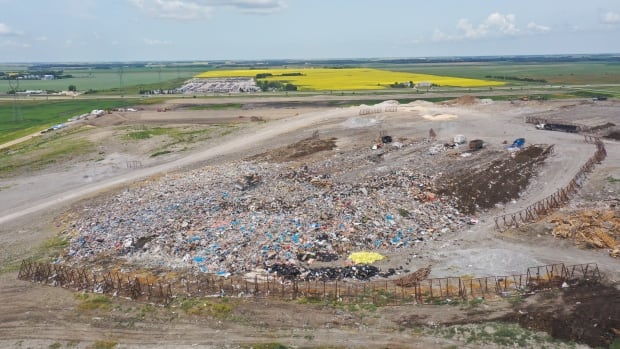
WARNING: This story contains distressing details.
The Manitoba government has cleared one more hurdle in the push to search a Winnipeg-area landfill for the remains of two victims of an admitted serial killer.
The province’s environmental approvals branch has given the green light to alter Waste Connections of Canada’s Environmental Act licence to allow a search of the Prairie Green landfill.
That licence alteration was one of the requirements for a search to move forward listed in a feasibility study conducted about the search of the landfill just outside of Winnipeg.
In a letter to a manager at Waste Connections obtained by CBC News, the province says it’s approving the needed change as the company seeks “to begin a humanitarian search activity within the landfill.”
The letter says the scope of the work will include:
- Excavating materials from part of the landfill.
- Developing and running a search facility.
- Hauling the landfill materials to the search site.
- Returning them to the active part of the dump once the materials have been searched.
The letter says anyone affected by the decision has until July 10 to appeal in writing to the environment minister.
Donna Bartlett, whose granddaughter Marcedes Myran is one of the women whose remains are believed to be in the landfill, said she was glad to hear the search would likely start by the end of the summer and continue through the winter.
“I am really happy and my girl is happy, and we’ll get her home,” Bartlett said on Tuesday as she and her family headed to the landfill for a ceremony and prayer after a meeting with Premier Wab Kinew about the search.
Jorden Myran, the sister of Marcedes Mryan, declined an interview at the legislative building. However, she posted on Facebook saying, “I’ve fought so incredibly hard for this and although it shouldn’t have taken this long I’m still so grateful that we are now doing it.
“I want to thank all of our supporters who showed up to all of our protests and helped us fight for this and get this done.”
Long list of conditions for approval
The environmental approval comes with a long list of conditions, including that the landfill dispose of all non-hazardous solid waste created or collected during the search in the active part of the dump, unless it gets recycled.
It will also have to take steps to minimize the presence of animals at the site, and retrieve any waste that gets blown into adjacent properties or accumulated in the development.
The landfill is also required to make sure the search facility has equipment and supplies to clean up any spills, and provide a layout map of its waste storage area within the search facility two weeks before starting any construction related to the search.
Other conditions include rules related to managing leachate, completing soil testing and reporting how much waste was excavated and returned during the search.
The update comes a day after closing arguments in the first-degree murder trial of Jeremy Skibicki, who in 2022 admitted to killing three First Nations women — Rebecca Contois, 24, Morgan Harris, 39, and Myran, 26 — and an unidentified woman community leaders have given the name Mashkode Bizhiki’ikwe, or Buffalo Woman. Police have said they believe she was an Indigenous woman in her 20s.
Skibicki told police he killed the women in his apartment, then threw their remains in garbage bins in the area.
While Contois’s partial remains were found in those garbage bins and at a landfill in Winnipeg, Harris’s and Myran’s remains are believed to be at the Prairie Green landfill outside the city. Police have not said where they think Mashkode Bizhiki’ikwe’s remains are.
While prosecutors argued the killings were motivated by racism and homicidal necrophilia, Skibicki’s defence argued he should be found not criminally responsible due to mental disorder. The judge has reserved his decision until July 11.
The provincial and federal governments each announced $20 million to help fund the landfill search earlier this year.
Support is available for anyone affected by these reports and the issue of missing and murdered Indigenous people. Immediate emotional assistance and crisis support are available 24 hours a day, seven days a week through a national hotline at 1-844-413-6649.
You can also access, through the government of Canada, health support services such as mental health counselling, community-based support and cultural services, and some travel costs to see elders and traditional healers. Family members seeking information about a missing or murdered loved one can access Family Information Liaison Units.